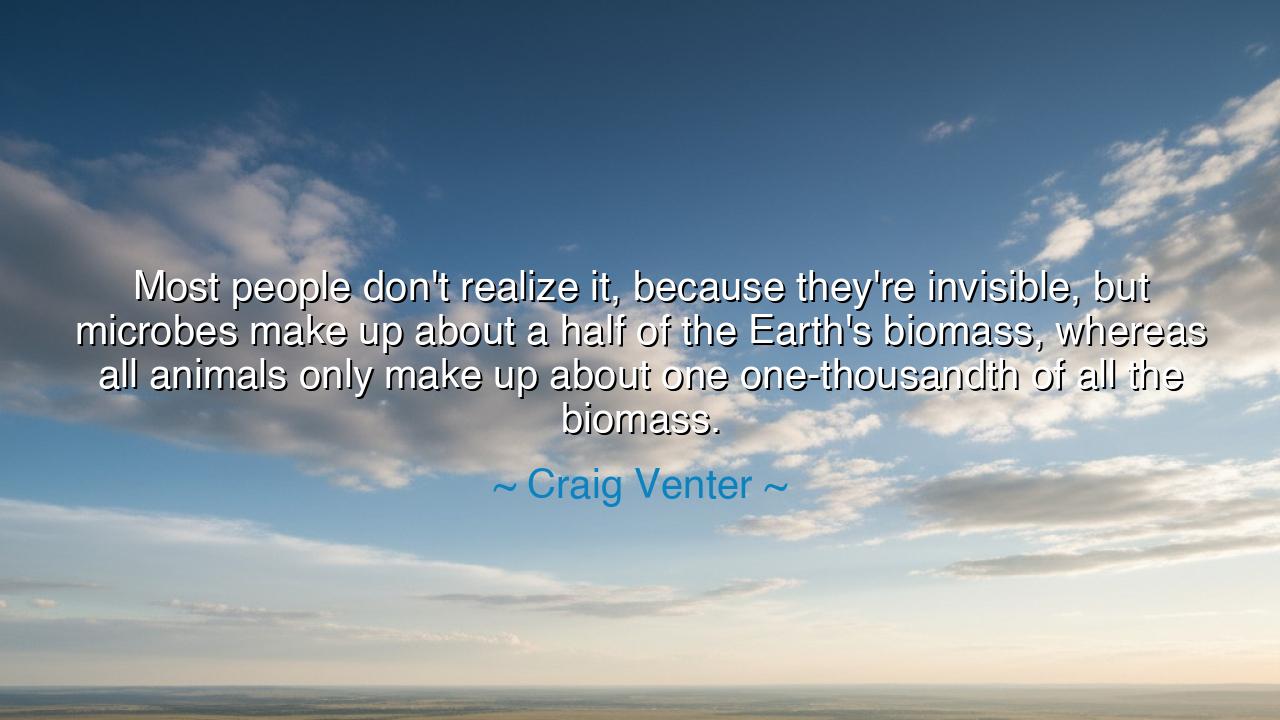
Most people don't realize it, because they're invisible, but
Most people don't realize it, because they're invisible, but microbes make up about a half of the Earth's biomass, whereas all animals only make up about one one-thousandth of all the biomass.






“Most people don't realize it, because they're invisible, but microbes make up about a half of the Earth's biomass, whereas all animals only make up about one one-thousandth of all the biomass.” Thus spoke Craig Venter, the explorer of genomes, who sailed the seas not to chart continents, but to map the hidden life of the planet. In this saying, he tears away the veil of human pride and reveals a startling truth: the Earth does not belong chiefly to man, nor even to beasts, but to the microbes, the unseen hosts that swarm in every ocean, soil, and body. Though invisible to the naked eye, their dominion is vast; their numbers dwarf the mighty herds and forests; their presence sustains all that we see.
The origin of this truth lies in the revolution of biology. For ages, men believed that life was defined by what they could behold—plants, animals, and themselves, the so-called lords of creation. Only with the coming of microscopes and genetic sequencing did humanity awaken to the immensity of the unseen. It was Venter and others who revealed that microbes, from bacteria to archaea, make up not merely a fragment of life, but the very bulk of it. They cycle the carbon, the nitrogen, the oxygen; they form the hidden machinery of ecosystems; they are the ancient architects of Earth’s living systems.
History gives us a vivid reminder of their power. In the 14th century, the Black Death, borne by microbes, swept through Europe and ended nearly a third of its people. Armies fell, kingdoms trembled, faith itself was shaken. What mighty kings and swords could not accomplish, invisible microbes achieved with ease. Here we see the humbling truth of Venter’s words: what is invisible to the eye may be greatest in strength. The smallest can topple the proudest, and what is overlooked may, in fact, be the foundation of the world.
Yet microbes are not only destroyers. They are also creators and sustainers. It was ancient cyanobacteria that filled Earth’s atmosphere with oxygen, making possible the rise of animals and, eventually, humankind. In the soil, microbes weave nutrients for crops; in the ocean, they form the base of the food chain. Even within our bodies, trillions of microbes live as companions, digesting food, shaping immunity, and guarding health. Without them, we would perish. Thus, while invisible, they are the unseen pillars of life.
Venter’s words also carry a moral weight: we must learn humility. Too often, man imagines himself the center of creation, the crown of life. But the measure of biomass reveals another story: we are but a whisper compared to the chorus of microbes. The lesson is clear—life is not ordered by what seems grand to the eye, but by what endures and sustains. True greatness is not always visible, and power does not always roar. Sometimes it whispers, unseen.
The ancients too grasped this lesson, though dimly. The Stoics taught that the universe is bound together by hidden forces, unseen yet indispensable. In the East, sages spoke of the small that governs the great, of the invisible qi that flows through all things. Venter’s science echoes this ancient wisdom with modern proof: the unseen world of microbes shapes the destiny of the seen.
So, O listener, take this counsel into your heart: do not despise the small, nor neglect the unseen. In your own life, remember that what is quiet may be most essential, and what is hidden may be most powerful. As microbes sustain the Earth, so too small acts of kindness sustain the human spirit. As invisible forces shape the world, so too unseen habits shape your destiny. Live, then, with humility before the vastness of life, and with reverence for the small and the hidden, for in them lies the strength of creation.






AAdministratorAdministrator
Welcome, honored guests. Please leave a comment, we will respond soon